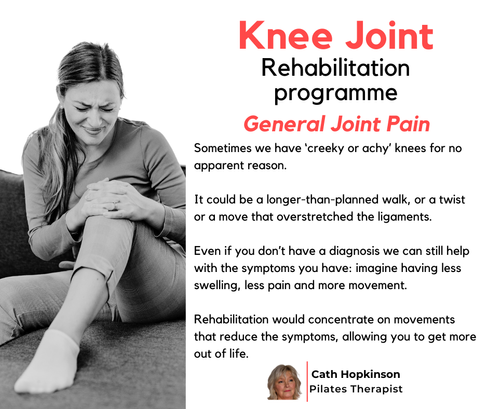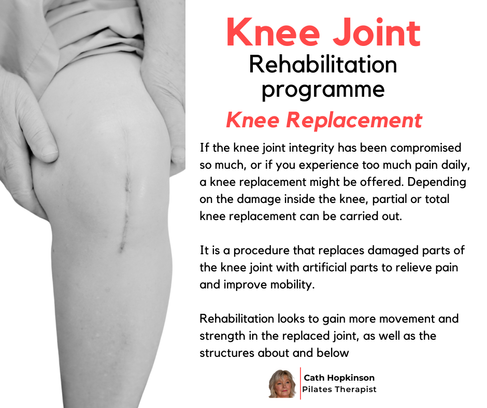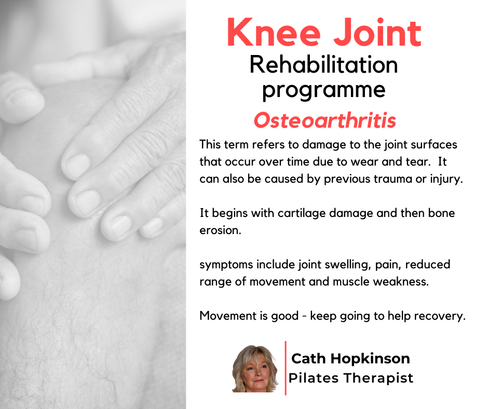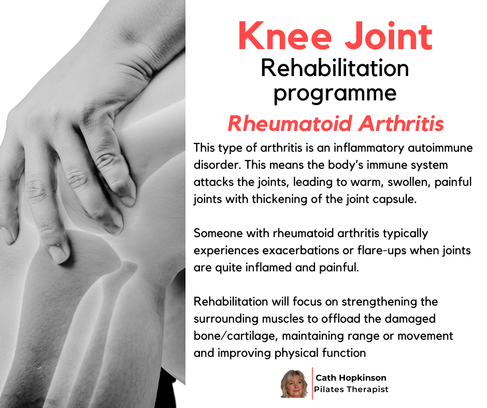Exploring the Healing Potential of Pilates for Knee Health: An Insider's Guide to Rehabilitation and Injury Prevention
- Cath Hopkinson

- Dec 2, 2024
- 4 min read
Knee pain affects millions of people in the UK, making day-to-day activities a challenge. The knee, the largest joint in the body, relies on a complex mix of bones, cartilage, ligaments, and tendons for movement. This complexity also leaves it vulnerable to various injuries, from fractures to ligament tears. With a significant portion of the population seeking relief from knee pain without resorting to medication or surgery, Pilates emerges as a promising option.
This guide will explore how Pilates not only aids in recovery but also helps in preventing future knee injuries.
Knowing that the knee joint is one of the most common joints to have problems, we start our new Pilates Therapy Knee Rehab course in January 2025, which can help a range of knee problems.

Common Types of Knee Injuries
Understanding knee injuries is essential for effective prevention and rehabilitation. below are some common knee injuries:
Knee Fractures
Knee fractures, especially of the patella (kneecap), are common injuries that typically occur from falls or accidents. Research shows that around 20% of all fractures involve the knee joint. The patella serves as a shield for the knee, absorbing significant impact forces.
Knee Dislocation
A knee dislocation happens when the bones in the knee joint become misaligned, often due to traumatic impacts in sports or accidents. According to studies, dislocations account for about 0.02% of all injuries in the sports context, yet they can lead to severe pain and long-term disability.
Knee Ligament Injuries
Injuries to knee ligaments, particularly the anterior cruciate ligament (ACL), are prevalent among athletes. Statistics indicate that up to 200,000 ACL injuries occur annually in the United States alone. These injuries can lead to significant instability and may require surgery.
Meniscus Tear
The meniscus acts as a shock absorber for the knee and is prone to tears from sharp twisting motions. Athletes in sports like football and rugby often face this issue. Studies show that nearly 61% of all knee pain is attributed to meniscus tears.
Knee Tendon Tears
Knee tendons can also suffer damage, often due to wear and tear. Middle-aged individuals participating in high-impact sports may experience tendon injuries more frequently. Research reveals that tendonitis affects over 30% of athletes, particularly those involved in jumping or running activities.
Some conditions an injuries we can help with:
How Can Pilates Help with Knee Health
Pilates is celebrated for its holistic approach to fitness, emphasising core strength, flexibility, and body awareness—all of which support knee health. Here are the ways Pilates can positively impact the knees:
Strengthening Muscles for Joint Support
The strength and balance of the muscles surrounding the knee are vital for maintaining joint health. Pilates targets core stability and strength, which can support the knees effectively.
For instance, a study found that individuals who practised Pilates regularly saw a 25% increase in strength of the quadriceps and hamstrings. This balanced muscle development helps distribute stress evenly across the knee joint, reducing the risk of injuries.
Improving Flexibility and Range of Motion
Flexibility plays a crucial role in overall joint health. Through Pilates, participants can enhance the flexibility of the muscles and tendons around the knee.
Regular practice can lead to a 30% improvement in flexibility, as reported by many practitioners. More flexible muscles can lead to increased joint range of motion, reducing stiffness and discomfort.
Correcting Posture and Alignment
Poor alignment and posture can cause or exacerbate knee pain. Pilates promotes an understanding of body mechanics that encourages better posture and movement patterns.
Improved alignment can decrease stress on the knees, allowing for better functional movement. For example, individuals with better alignment often report a 50% reduction in knee pain during daily activities.
Promoting Mind-Body Connection
Pilates fosters mindfulness through controlled movements and breath-work. This deeper awareness helps individuals recognise tension areas and misalignments.
By cultivating this mind-body connection, individuals can make better movement choices, effectively managing physical limitations while enhancing recovery and injury prevention.

Modifications and Cautions
While Pilates supports knee health, it's crucial to approach exercises thoughtfully. Individuals recovering from significant injuries or surgeries should consult healthcare professionals before starting.
Listen to Your Body
Being attentive to how your body feels during each exercise is vital. If you experience pain, stop and reevaluate. Modifications might be necessary to ensure safety and effectiveness.
Use Proper Form
Maintaining correct form is essential in Pilates to prevent further injuries. Consider working with a certified Pilates instructor for personalised guidance and to ensure you're performing exercises correctly.
Incorporate Rest and Recovery
Rest days play a crucial role in the recovery process. Giving your body adequate time to heal can significantly enhance overall progress.
Embracing a Holistic Approach to Knee Health
Pilates offers a powerful, holistic approach to knee health. It equips individuals with tools for rehabilitation and injury prevention, making it a valuable resource for anyone struggling with knee pain or looking to maintain optimal joint functioning.
Incorporating Pilates into your routine—with a focus on strength, flexibility, and proper alignment—can significantly transform knee health. With dedication and the right exercises, individuals can reclaim their mobility and enjoy a pain-free lifestyle. Always ensure to consult with a healthcare professional or trained instructor when starting your Pilates journey toward better knee health.
Exploring the healing potential of Pilates for knee health is like unlocking a pathway to improved recovery and wellness—a journey toward a more balanced, resilient, and pain-free life.
A new Pilates Therapy course for Knee pain starts in January and all are welcome if you would like to improve your knee health and feel ready to tackle your day in a more positive way.
Email Cath - at team@healthybestyou.co.uk or phone 07941012305 for more details and an informal chat.










Comments